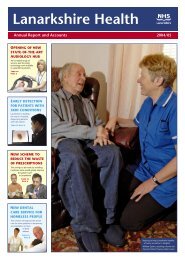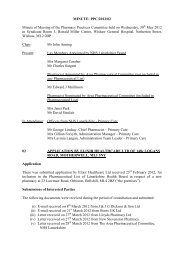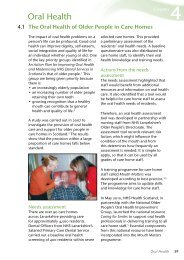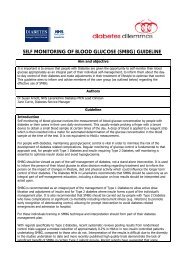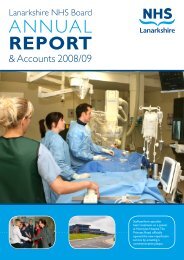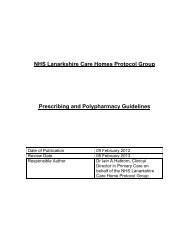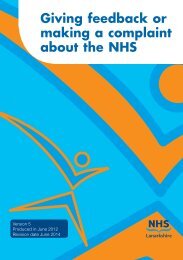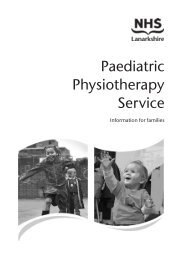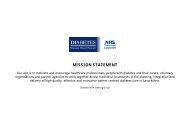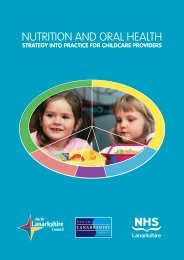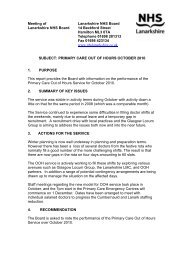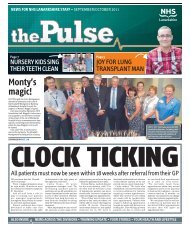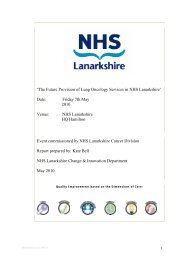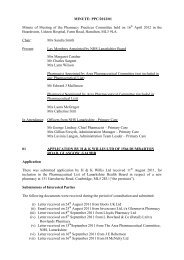Palliative Care Guidelines - NHS Lanarkshire
Palliative Care Guidelines - NHS Lanarkshire
Palliative Care Guidelines - NHS Lanarkshire
- No tags were found...
You also want an ePaper? Increase the reach of your titles
YUMPU automatically turns print PDFs into web optimized ePapers that Google loves.
<strong>Palliative</strong> <strong>Care</strong> <strong>Guidelines</strong>: DeliriumDelirium in <strong>Palliative</strong> <strong>Care</strong>DefinitionDisturbed consciousness and inattention with cognitive impairment; acute onset and fluctuatingcourse as a physiological consequence of disease or treatment.(Other terms: acute confusional state, agitation, terminal restlessness)Assessment• Common (30-85% of hospice inpatients), often reversible but diagnosed late.• Three types:o Hyperactive – increased arousal and agitation.o Hypoactive – quiet, withdrawn and inactive: more common but often missed ormisdiagnosed as depression.o Mixed pattern.• Diagnosis depends mainly on careful clinical assessment; consider using Mini-Mental StateExamination or Abbreviated Mental Test.• Causes include:o Drugs (including: opioids, anticholinergics, steroids, benzodiazepines, antidepressants,sedatives).o Drug withdrawal (alcohol, sedatives, antidepressants, nicotine).o Dehydration, constipation, urinary retention, uncontrolled pain.o Liver or renal impairment, electrolyte disturbance (Na, Ca, glucose), infection, hypoxia,cerebral tumour or cerebrovascular disease.o Visual impairment and deafness are risk factors.Differential diagnosis: depression, dementia (increased risk of developing delirium).Management (treat underlying causes)• If terminal delirium – see: Last days of life.• Review all medication and stop any non-essential drugs.• Maintain hydration, oral nutrition and mobility.• Check for opioid toxicity (drowsiness, agitation, myoclonus, hypersensitivity to touch), reduceopioid dose by 1/3. Consider switching to another opioid if delirium persists.See: Choosing & Changing opioids.• Check for constipation, urinary retention or catheter problems.• Check full blood count and biochemistry, including calcium.• Check for infection (urine infection in the elderly).• If nicotine dependent, consider using replacement patches.Medication (if essential to control symptoms)• Review regularly and withdraw medication as soon as the patient recovers.First choice: haloperidol• Dose: 0.5-3mg oral or subcutaneous (start with a low, oral dose).• Repeat after 2 hours, if necessary.• Maintenance treatment may be needed if cause cannot be reversed; use lowest effective dose:0.5-3mg oral or 2.5mg SC, once daily.Second choice: benzodiazepines• Benzodiazepines do not improve cognition; may help anxiety.• Used in alcohol withdrawal (often at higher doses), sedative and antidepressant withdrawal;preferred in Parkinson’s disease.• Lorazepam 0.5-1mg oral or sublingually.• Midazolam SC 2.5-5mg, 1-2 hourly OR diazepam oral or PR 5mg, 8-12 hourly.© <strong>NHS</strong> Lothian Issue date: January 2009 Review date: March 20121



